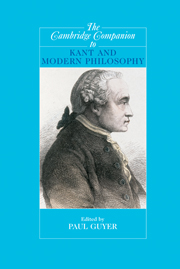Book contents
- Frontmatter
- Introduction: The starry heavens and the moral law
- 1 “A Priori”
- 2 Kant on the perception of space (and time)
- 3 Kant’s philosophy of mathematics
- 4 Kant on a priori concepts: The metaphysical deduction of the categories
- 5 Kant’s philosophy of the cognitive mind
- 6 Kant’s proofs of substance and causation
- 7 Kant and transcendental arguments
- 8 The critique of metaphysics: The structure and fate of Kant’s dialectic
- 9 Philosophy of natural science
- 10 The supreme principle of morality
- 11 Kant on freedom of the will
- 12 Mine and thine? The Kantian state
- 13 Kant on sex and marriage right
- 14 Kant’s theory of peace
- 15 Kant’s conception of virtue
- 16 Kant’s ambitions in the third Critique
- 17 Moral faith and the highest good
- 18 Kant’s critical philosophy and its reception - the first five years (1781-1786)
- Bibliography
- Index
15 - Kant’s conception of virtue
Published online by Cambridge University Press: 28 March 2007
- Frontmatter
- Introduction: The starry heavens and the moral law
- 1 “A Priori”
- 2 Kant on the perception of space (and time)
- 3 Kant’s philosophy of mathematics
- 4 Kant on a priori concepts: The metaphysical deduction of the categories
- 5 Kant’s philosophy of the cognitive mind
- 6 Kant’s proofs of substance and causation
- 7 Kant and transcendental arguments
- 8 The critique of metaphysics: The structure and fate of Kant’s dialectic
- 9 Philosophy of natural science
- 10 The supreme principle of morality
- 11 Kant on freedom of the will
- 12 Mine and thine? The Kantian state
- 13 Kant on sex and marriage right
- 14 Kant’s theory of peace
- 15 Kant’s conception of virtue
- 16 Kant’s ambitions in the third Critique
- 17 Moral faith and the highest good
- 18 Kant’s critical philosophy and its reception - the first five years (1781-1786)
- Bibliography
- Index
Summary
VIRTUE ETHICS BEFORE KANT
Most ancient ethicists regarded virtues both as instrumentally valuable qualities of a person that enable her to live well, and also as valuable in themselves by being partly constitutive of happiness (eudaimonia). The four cardinal virtues recognized by most ancient ethicists are courage, temperance, justice, and intelligence. Common among ancient theories of virtue are the following theses. First, the virtues are stable dispositions. For someone to be brave, she must be reliable and constant in her brave acts; they must be characteristic of her. Second, though ancient philosophers often described virtues as habits, they did not take them to be mere habits. Virtues are dispositions that require cultivation and involve choice. Third, virtues involve reason. To be virtuous, a person must not only do or pursue the right things; she must know why they are the right things. The intellectual aspect of the virtues is illustrated by the common ancient view that virtues are a special kind of craft, or are formally similar to crafts in some ways.
Fourth, for many ancients, virtue involves emotions. Plato (ca. 430-347 b.c.e.) and Aristotle (384-322 b.c.e.) took the soul to have both rational and non-rational parts, and virtue to involve both. Aristotle emphasized that the development of virtue requires not merely gaining control of one's emotions, but training them, bringing them into harmony with one's judgments about what is valuable and what virtue requires.
- Type
- Chapter
- Information
- The Cambridge Companion to Kant and Modern Philosophy , pp. 505 - 537Publisher: Cambridge University PressPrint publication year: 2006
- 16
- Cited by



